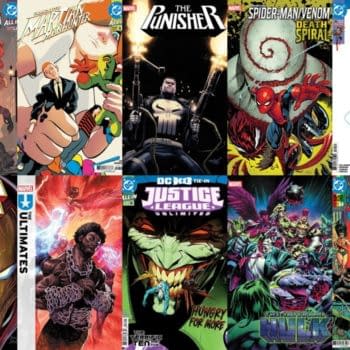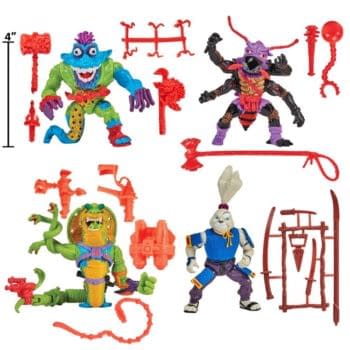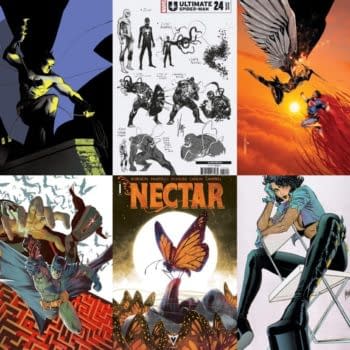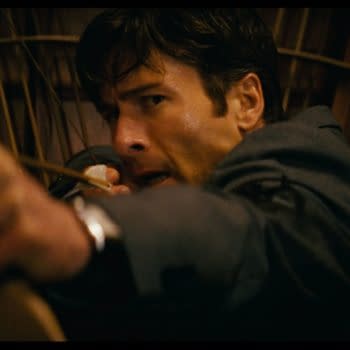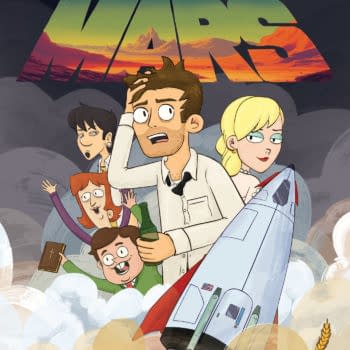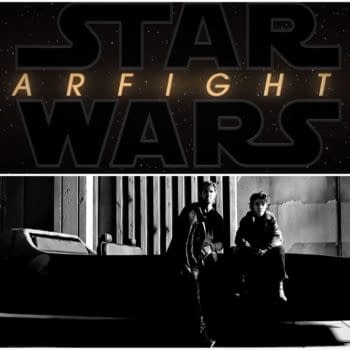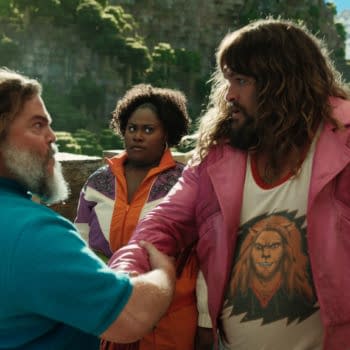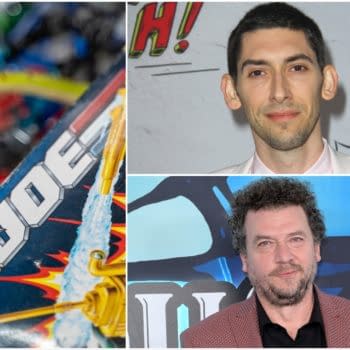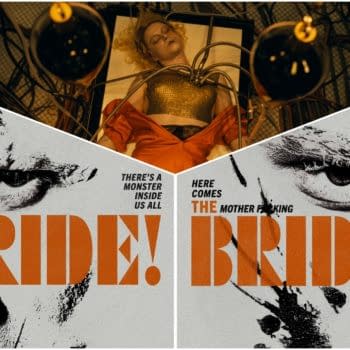Posted in: Look! It Moves! by Adi Tantimedh, Movies | Tagged: bioware, games
Look! It Moves! by Adi Tantimedh: The Mass Effect 3 Effect, Or When Endings Make Fans Mad
WARNING: Do not read if you don't want to know the ending of MASS EFFECT 3 yet.
If you don't care or want to have a bitter laugh over how a multimillion-dollar franchise may have shot itself in the foot, read on.
So the biggest news in gaming the past week has been the growing rage and disappointment over the ending of MASS EFFECT 3, in an otherwise excellently- designed and written game. By now, the game developer Bioware's message boards have accrued over 1,000 pages of outraged and heartbroken posts from fans about how disappointed they are in the end of the game, which is supposed to be the pay-off of a unique trilogy in games that first came out in 2007. And the game hasn't even been out for a whole week. That means a bunch of players have devoted the 40-odd hours it would take to reach the ending.
You might assume this was just another outpouring of nerd hate, haters-gotta-hate, and some fans haven't done themselves any favours by doing things like issuing threats or reporting EA and Bioware to the Federal Trade Commission for alleged false advertising, the latter of which is a level of over-the-top nobody expected. A Facebook page protesting the ending has gathered over 30,000 joins, and another group has already raised over $50,000 for the charity Child's Play to raise awareness for their dislike of the ending. The game's Amazon page has been spammed with over 500 user reviews of only one star complaining about the ending. There are those demanding that Bioware fix the ending, provide a new one through DLC. Even the mainstream media is picking up on this, like Forbes.com, which has been posting commentaries and news on it nearly everyday since Wednesday.
From a business point of view, of course you want fans to remember your product and continue to debate and discuss it. You want fans to be passionate. What you definitely do not want is what looks like 80% of your most loyal fans heartbroken, pissed off and baying for your blood.
People write extensively about games have weighed in on the ending, the best ones include Sparky Clarkson, Cruise Elroy and Rock Paper Shotgun's Richard Corbett, as have some increasingly snarky Youtube commentaters, so I'm going to try not to repeat too much of it here.
I'm not just posting these links or writing this column for shits and giggles. Those blogs are worth reading for anyone who cares about storytelling, what stories are supposed to do and an audience's emotional investment in stories, and in the end, why stories matter. Stories, are, after all, allegories that bring sense and order to reflections of life where real life itself is too chaotic to make sense of, whether they're period dramas like DOWNTON ABBEY or Science Fiction games like MASS EFFECT or a comic like latest issue of THE AVENGERS.
Jeremy Jahns' youtube review of the ending:
[youtube]http://www.youtube.com/watch?v=4H_A7SeawU4[/youtube]
Snarky:
[youtube]http://www.youtube.com/watch?v=Q2JvFph0FXg[/youtube]
There's a part of me that's impressed that a big production company has seen fit to essentially destroy the entire basis of a successful franchise. It doesn't just end Commander Shepherd's story, it ends the entire Mass Effect universe as well. The ending, no matter which of the three final choices you have your Shepherd make, effectively ends Galactic Civilisation. Everyone dies. All the friends Shepherd made, all the wars Shepherd negotiated an end to, all the feuding species Shepherd brokered peace for, are dead because she blew up the mass relays, whose explosions obliterated all the planets in their regions. This is why fans feel heartbroken, betrayed and angry. And they have every right to feel that way.
I don't think they ever set out to piss off the fans, but from a business standpoint, there is no way this wouldn't be seen as a massive screw-up. In more than just the story sense, this could be the end of the MASS EFFECT franchise. Bioware have said that they wanted an ending that might be polarizing and inspire discussion, but surely they couldn't have foreseen the sheer amount of outrage and vitriol that's been brewing since last week. This is like if the original architects of Crystal Palace, after all the acclaim and praise for their work, decided to burn the whole thing down themselves.
I think Bioware miscalculated. By now, they must realise they miscalculated. I can't help putting my story editor's hat on and think about what their intent was. I think they wanted a transcendent ending with grand themes you find in Science Fiction, in this case involving the Singularity and the prospect of a post-human and organic future. My problem is that the final 15 minutes feels tacked on, is based on abstract concepts rather than anything to be emotionally invested in, and the science behind the decisions is wonky. If you choose the "destroy the Reapers" option, you would be destroying all synthetic life in the galaxy, including the Geth race you might have brokered peace with. Why should the big machine do that? Synthetic life means robots, artificially-created life, machines, and why wouldn't the Crucible have been designed specifically to destroy only the Reapers? Then there's the supposedly more peaceful choice of "synthesis", where the Crucible is used to fuse synthetic and organic life together to form a new kind of life and end the reason for synthetics and organics to be at war. This science makes no sense because organic life mixed with synthetics is bionics, the latter usually imposed or attached surgically to organic bodies and might be an evolutionary dead-end. I don't begrudge the writers trying for something new, but in this case, they had to stretch the pseudo-science to absolute bollocks in order to have an ending that the audience really did not want. If the game had ended with the badly-wounded Shepherd just firing off the Crucible and sitting back to watch the Reapers blow up, saving the galaxy, that would have been a perfectly satisfying ending. Shepherd's story is done, and the ambiguity of whether she would survive her wounds or not could have given the end a nice grace note as she passes into legend. I doubt the fans would have complained as loudly even about that. Destroying Galactic Civilisation and killing everyone she knows should never have been considered a decent happy ending. Even the fans, bloggers and pundits who liked the endings have had to overlook the plotholes.
I don't think fans would have been so pissed off if Shepherd had just died. It's that Shepherd died destroying the whole galaxy, which turns her into the biggest war criminal ever, as was pointed out. After all, there was no outcry if your hero in Bioware's other game DRAGON AGE: ORIGINS died heroically saving the land, since all the people that were saved were shown going on with their lives after that. Or the tragic endings to Rockstar's two critically-acclaimed games RED DEAD REDEMPTION and LA NOIRE. Those endings were earned. They were true to the characters and the story and its theme, and they made sense. Audiences are generally intuitive enough to sense when an ending feels wrong, even if they can't put their finger on why and can only articulate it as wanting a happier ending or a "better" one that they can't describe.
When I was starting out in Film, I was taught very early on that endings were extremely important. They are the culmination of everything the storyteller wants to say and accomplish with the story. They are the completion of a journey. In Hollywood, a bad ending can destroy the box office prospects of a movie, no matter how good everything before it was, and this has been proven time and again, the latest example being WALL STREET 2: MONEY NEVER SLEEPS, whose unearned and too neat happy ending resulted in bad word-of-mouth and the movie bombing. With tens, possibly even hundreds, of millions of dollars, at stake, of course the studios would spend a lot of time and money market-testing endings and rewriting and reshooting them where they deemed it necessary. Whether they always get it right is another discussion.
Changing the ending of a game is not unprecedented. After the outcry over the end of FALLOUT 3 where the main character you play appears to die, Bethesda released an expansion DLC that resurrected the character in an "oh, you didn't die after all. A few weeks in hospital and you're right as rain" solution where your character could just carry on having adventures. The PC version of PORTAL received a patch that changed the cinematic in the last minute of the game story to set up PORTAL 2.
And many authors and filmmakers have often said they wished they could have made a different ending to the stories they released. The unusual thing about games is that the makers can actually change a story's ending after its release through a patch. The other thing is, this isn't the movies or comics. These are video games, which are an expensive investment for fans and players who fork out the $60 or £40 to spent dozens of hours of their time to be immersed in the story. This is a business that needs the goodwill and trust of its customers, and the ubiquity of the internet, message boards and social networks makes this uncharted and unpredictable territory for any business that creates popular culture, which depends on – needs – the goodwill of fans. Comic book fans might complain but they don't get anywhere as loud or potentially destructive or organized as video game fans. And this reaction might still grow since the game only just came out. Some of their actions may be questionable, but they're fully entitled to their feelings and their emotional reactions.
The question is whether the makers really should implement a new ending. The damage is already done. You can't travel back in time to prevent the fans from experiencing that shock of betrayal, insult and heartbreak that took them by surprise. The damage is already done, and will continue to be done as more fans and players experience it in the weeks and months to come. Might a new ending prevent further damage where that the people who haven't played it yet won't feel betrayed and insulted? Or might that engender even more discontent? That idea intrigues me, though I don't know if I really agree with it. The story editor in me believes in correcting big mistakes, but usually before official release. The best they can do is apologise for it and move on. But I'm not the one with a multimillion-dollar franchise in my care.
I can't help but wonder why the some of the most potentially interesting and resonant Science Fiction series in the visual mediums – movies, TV and games – in the last 12 years have come a cropper with their endings: this happened to THE MATRIX TRILOGY, LOST, BATTLESTAR GALACTICA after which they became tainted as brands and the fans lost faith, and now MASS EFFECT is in danger of joining that unenviable list.
Makes me wonder if there's something in the air that the writers breathed that caused their brains to flop over and melt in the last hurdle just when they were about to go out on a win.
Now there's a Science Fiction idea.
Refusing to end, choosing eternity at lookitmoves@gmail.com
Follow the official LOOK! IT MOVES! twitter feed at http://twitter.com/lookitmoves for thoughts and snark on media and pop culture, stuff for future columns and stuff I may never spend a whole column writing about.
Look! It Moves! © Adisakdi Tantimedh










